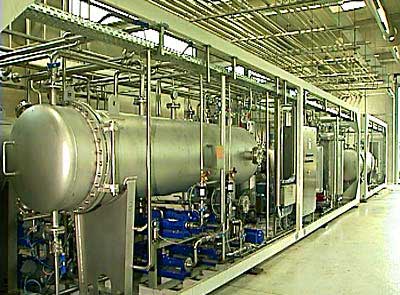The research results on the production of biodiesel from vegetable oils by the Petroleum Refining Technology Research Center (Ho Chi Minh City University of Technology) have paved the way for a new direction, discovering a “clean” fuel source that does not pollute the environment.
 |
|
Biodiesel sample in the laboratory (Photo: ND) |
Currently, in Vietnam, the consumption of diesel fuel is increasing.
In 1996, the consumption was 2.795 million tons; by 2005, it had nearly doubled (4.822 million tons), and it is projected that by 2010, this figure will reach 7.168 million tons.
Laboratory Results
In 2000, a research group from the Department of Oil and Gas Processing Technology and the Oil Refining and Petrochemical Center began studying the potential for biodiesel production from vegetable oil sources. This included studies on the direct blending of vegetable oil and diesel fuel to replace traditional diesel, as well as synthesizing biodiesel from coconut oil, among others.
To reduce the cost of biodiesel production, Engineer Phan Ngoc Anh and his colleagues experimented with used cooking oil from food processing. This research focused on the esterification reaction of waste cooking oil using chemical methods with alkaline catalysts.
The results of the survey on the impact of blended fuel systems on technical performance and emissions from the engine under both no-load and loaded conditions showed that a mixture of 20% biodiesel and 80% diesel could completely serve as a substitute for traditional diesel fuel.
Dr. Nguyen Huu Luong, Deputy Director of the Oil Refining and Petrochemical Center, stated that this mixture does not require additives and no engine components need to be replaced when using biodiesel. A comparison of emissions when using biodiesel and diesel revealed that hydrocarbon levels in engine emissions decreased by 65%, CO2 reduced by 35%, and particulate matter decreased by 40%.
Can it be realized?
One of the main obstacles to the widespread use of biodiesel is its cost. The production cost of biodiesel is still about twice that of diesel fuel. If biodiesel can be produced from inexpensive sources like used cooking oil, it could become a widely used fuel in the future.
Dr. Nguyen Huu Luong mentioned that if the center buys waste cooking oil at a price of 2,000 – 3,000 VND per liter, biodiesel could be produced at a cost of 6,000 – 7,000 VND per liter. This price could compete with the current market price of diesel (7,900 VND per liter).
Several hotels in Ho Chi Minh City, such as Kim Do, Grand, Huong Sen, and Bong Sen, have expressed support for the biodiesel production project and are willing to cooperate in collecting used cooking oil and grease from wastewater.

Biodiesel production plant in Zistersdorf (Austria).
(Photo: eipeldauer)
Additionally, instant noodle production facilities and food processing plants can collect significant amounts of used cooking oil and are also willing to sell it to the center for biodiesel production. The Department of Science and Technology of Ho Chi Minh City will also call for production facilities, restaurants, and hotels that use vegetable oil to participate in the project through various supportive policies aimed at reducing environmental pollution and promoting cleaner production methods.
Nevertheless, Dr. Luong remains concerned and apprehensive that without government support, biodiesel production will face many difficulties. He emphasizes the need for appropriate tax policies to support the development of biodiesel research and usage, as well as to raise public awareness about sustainable environmental practices to encourage participation in the project.
|
Biodiesel, also known as biodiesel fuel, is used for diesel engines and is derived from vegetable oils or animal fats. Biodiesel can be produced from any type of vegetable oil or animal fat, including used ones. In Vietnam, biodiesel can be produced from soybean oil, peanut oil, coconut oil, basa fish fat, and other used oils and fats. Biodiesel has many advantages, including being a renewable energy source; reducing environmental pollution and greenhouse gases; being non-toxic and biodegradable; usable directly, and extending engine life. |


















































